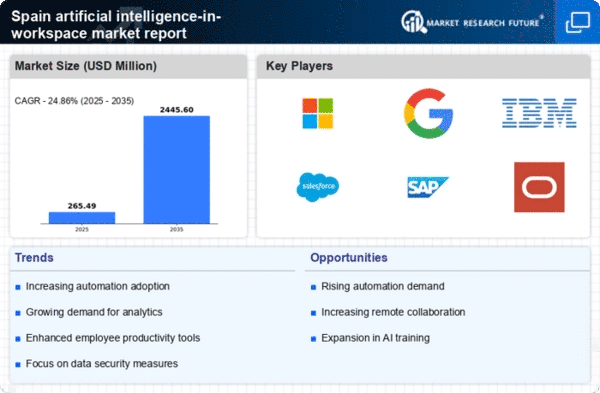Increased Investment in AI Startups
Investment in AI startups is gaining momentum in Spain, contributing to the growth of the artificial intelligence-in-workspace market. Venture capital funding for AI-related ventures has surged, with over €300 million invested in the past year alone. This influx of capital is fostering innovation and the development of new AI applications tailored for workplace environments. As startups introduce novel solutions that address specific business challenges, the market is likely to see a diversification of AI offerings. This trend indicates a vibrant ecosystem that supports the ongoing evolution of the artificial intelligence-in-workspace market.
Rising Demand for Automation Solutions
The artificial intelligence-in-workspace market in Spain is experiencing a notable surge in demand for automation solutions. Businesses are increasingly recognizing the potential of AI to streamline operations, enhance productivity, and reduce operational costs. According to recent data, approximately 45% of companies in Spain have integrated some form of AI technology into their workflows. This trend is driven by the need for efficiency and the desire to remain competitive in a rapidly evolving market. As organizations seek to optimize their processes, the adoption of AI-driven automation tools is likely to continue growing, thereby propelling the artificial intelligence-in-workspace market forward.
Emergence of AI-Powered Collaboration Tools
The rise of remote work and hybrid models has led to the emergence of AI-powered collaboration tools in Spain. These tools facilitate seamless communication and project management, thereby enhancing team productivity. The artificial intelligence-in-workspace market is likely to benefit from this trend, as businesses seek innovative solutions to support their workforce. Recent surveys indicate that 60% of companies are investing in AI-driven collaboration platforms to improve team dynamics and project outcomes. This shift towards AI-enhanced collaboration tools is expected to drive further growth in the market.
Growing Focus on Data-Driven Decision Making
In Spain, there is an increasing emphasis on data-driven decision making across industries, which significantly impacts the artificial intelligence-in-workspace market. Organizations are leveraging AI to analyze vast amounts of data, enabling them to make informed decisions that enhance operational efficiency. Reports indicate that companies utilizing AI for data analysis have seen a 30% improvement in decision-making speed. This trend reflects a broader shift towards integrating AI technologies into business strategies, suggesting that the artificial intelligence-in-workspace market will continue to expand as more organizations recognize the value of data analytics.
Government Initiatives Supporting AI Development
The Spanish government is actively promoting the development and integration of artificial intelligence technologies within various sectors. Initiatives aimed at fostering innovation and research in AI are being implemented, which is expected to bolster the artificial intelligence-in-workspace market. For instance, the government has allocated over €600 million to support AI research and development projects. These efforts not only enhance the technological landscape but also encourage businesses to adopt AI solutions, thereby driving market growth. The alignment of public policy with industry needs suggests a promising future for AI in the workspace.
















